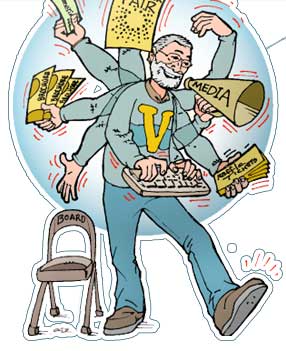








Peaceful Nation Canada Now Major Arms Dealer
Brandon Sun “Small
World” Column, Sunday, November 4/07
Zack Gross
Zack Gross
Canadians have always prided themselves in being a nation that provides armed forces only to peacekeeping roles in world trouble spots. In recent years, our involvement in Afghanistan has raised concerns, as our troops are active in a military campaign.
Government and military spokespeople offer some justification for our presence in Afghanistan, arguing that our soldiers are also involved in security, nation - building and development assistance. While we support our troops in the sense that we pray for their safety, a large percentage of Canadians are uncomfortable with the active, military role we have taken.
In the past 10 days, several credible reports have been published to show that Canada is earmarking as much money, $18 billion, for defense today as it did during the height of the Cold War and nuclear arms race with the Soviet Union.
After adjustment for inflation, it is the highest amount since World War II. Canada ranks sixth in NATO for arms spending and is among the world’s top arms exporters. It is the war in Afghanistan that is driving spending figures and critics of the war are using this in questioning that policy.
Meanwhile, Prime Minister Harper’s government is promising further spending to continue to build up the military.
While being the honest and peaceful broker used to be the role Canada played in order to be significant on the world stage, Defence Department supporters today say that more military spending is the way to do it.
Two respected monitoring agencies, one in Stockholm and one in Washington, D.C., have ranked Canada near the top of global arms exporters, with its peak being 2004.
The traditional major weapons suppliers have been the United States, Russia, the United Kingdom and France. In 2004, Germany ranked fifth, with Canada right behind, even more than China.
Over the five-year period of 2000 to 2004, Canada is ranked seventh overall. Canada reported to the United Nations Register of Conventional Arms shipments of weaponry to the United States, New Zealand, Australia and Saudi Arabia, including tanks and light armoured vehicles. Some arms do in fact flow to the Western countries mentioned and then on to other countries in combat zones.
Not all information on our military build-up and arms deals is easily available. Although 500 Canadian companies are making small arms, ammunition, grenade launchers and armoured vehicles, neither our current Conservative, nor the previous Liberal, government has reported to Parliament on military exports. CBC investigative journalists determined that our military exports increased 350% over the period of 2000 to 2006.
Military industry spokespeople argue that this kind of development is necessary in an insecure world with terrorism and failed states.
They also argue that our military industry creates tens of thousands of jobs for Canadians.
While the Minister of Foreign Affairs is responsible to report to Parliament annually on military exports, the CBC claims that no reports are available for 2003 onwards. Various excuses have been given, such as computer problems, and promises have been made, but not fulfilled.
In the United States, when concern arose about military export rules, the Bush Administration named a Special Prosecutor to look into the matter and reports were quickly tabulated and released.
A Geneva-based watchdog organization has recently downgraded Canada’s rating on arms industry transparency.
Even though Canada is active at the UN in backing a new international arms trade treaty, at home information is hard to get.
One government expert told a CBC reporter that the information that she sought would be “iffy” anyway – that “In this industry, there’s no such thing as the truth.”
In an insecure world, the question that arises is whether more arms will add to, or subtract from, security. Afghanistan and Iraq are two examples of countries destabilized by outside invention and arms dealing, as much as by internal affairs. Now Western troops are paying the price by fighting in these countries.
Some of our arms deals prop up unrepresentative or repressive regimes, or fuel civil or regional conflicts.
Canadians need to have that kind of information and politicians need to feel that the arms related decisions they make (or let slide) will impact on their public support.
There was a popular saying during the Viet Nam War, that “Killing one person is murder, but killing ten thousand people is foreign policy.”
Canadians need to speak out on our foreign and military policy, just as we speak out on local crime and violence rates.
Zack Gross is program coordinator at the Manitoba Council for International Cooperation (MCIC), a coalition of 36 international development organizations active in our province.
* * * * *
Return to Articles
Return to Articles